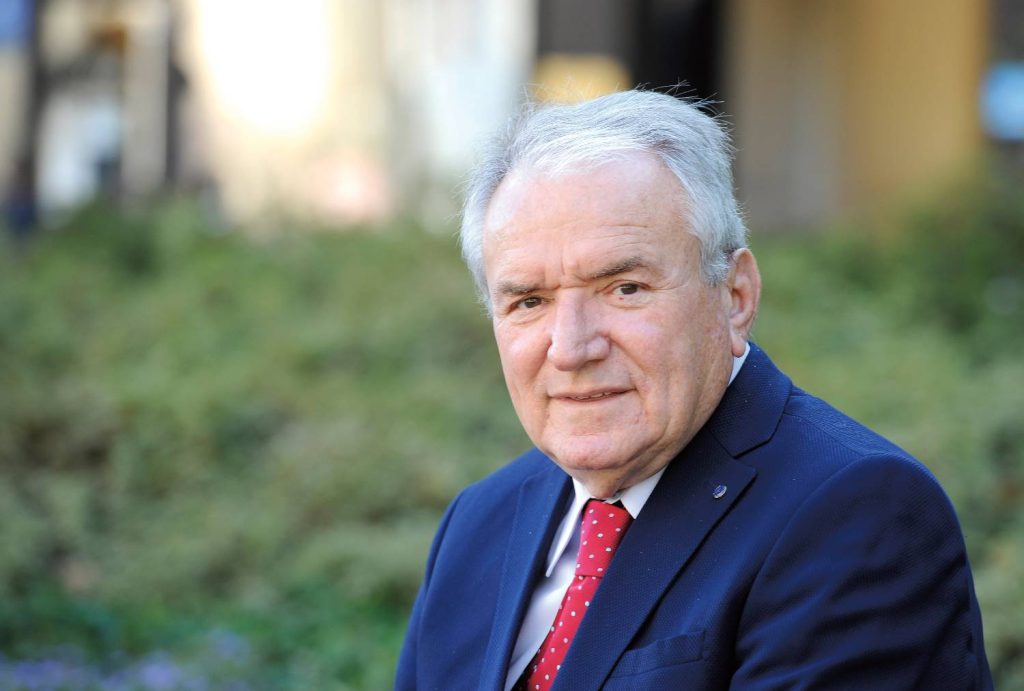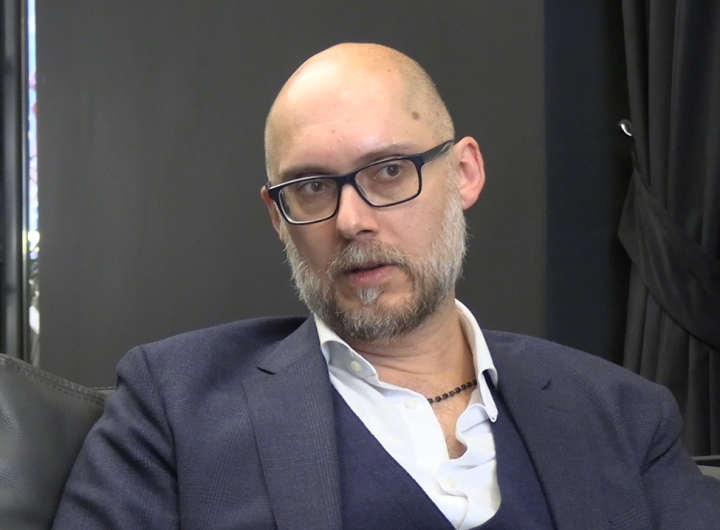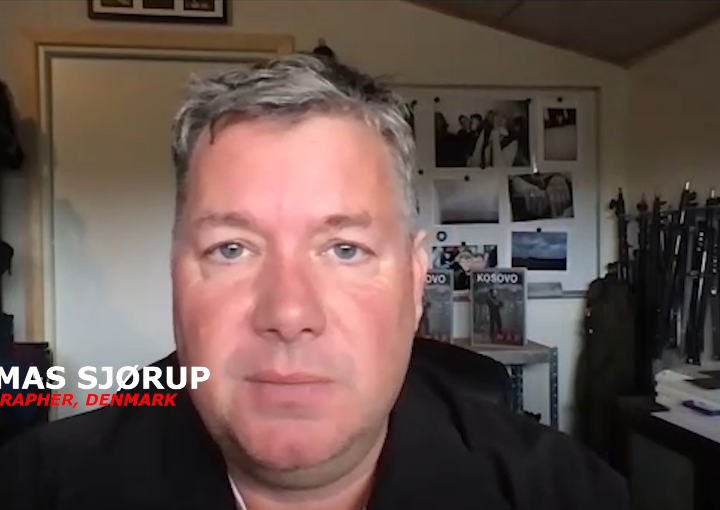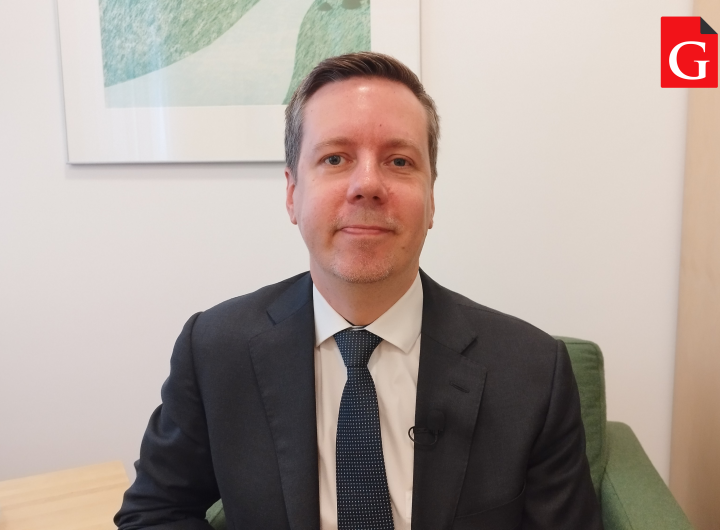
The power of the protests in Serbia is enormous, immeasurable, and I think no one should underestimate the power of the people, says Srecko Djukic, a former diplomat and member of the Forum for International Relations in Serbia, in an interview for The Geopost.
He adds that the regime in Belgrade is now in a trap, with no way out of this situation other than to step down from power.
“Of course, such a dictatorial, authoritarian regime will not do this unless it is absolutely necessary.” The government, he emphasizes, is well aware that we are entering the final phase of the “civil war in Serbia.” He adds that the civil war in Serbia has not only been going on for the last month or two. “The civil war in Serbia has been going on since this government came to power. That is when it divided the people into two camps.” Djukic is convinced that Serbia still has days and weeks of resolution ahead of it and that this resolution, “it seems to me, according to some logic, will reach its peak somewhere around the anniversary of the disaster that happened in Novi Sad.”
Full interview:
The Geopost: What is the potential of the current months-long protests in Serbia, and could the intervention of security forces, who are very visible among the protesters, disrupt the path to a potentially slightly better Serbia?
Djukic: The power of the protests in Serbia is enormous, immeasurable, I would say. And I think no one should underestimate this power of the people. These are no longer student protests in Serbia, but civic protests—they are nationwide protests.
And the last 10 or 11 months have already shown that this power is not weakening. And in fact, the main question today is how to bring these protests to an end, so that they take on a democratic form, so that they end in a democratic way and not in some other brutal, undemocratic way. I think this is the key question facing the movement, the uprising in Serbia. I think the regime itself is also aware of this. And that it is now simply in a trap, with no way out of this situation other than to step down from power, but of course such a dictatorial authoritarian regime will not do so unless it is forced to.
And all circumstances lead him to the conclusion that he will very soon find himself in a situation where he will have to step down from the political scene in Serbia, regardless of all the various rumors that are circulating. Including what you have added to the matter—certain services that were involved, and so on. The services have been working and are always working, I would never put them above the power of the people, nor are they above the power of the people, as has already been shown by a series of events, a series of historical circumstances, a series of things, ultimately in Serbia itself. Because if they worked, and they have worked from the very beginning, when the student movement was weaker, more disorganized, now the movement, as I said, has grown into a general civil process, now it is an unstoppable force and no service can stop it, no service can prevent it.
So, I would say that we are facing, as has been said for several years before the outcome of the 1990s, the days and weeks of the outcome, and it seems to me that, according to a certain logic, this outcome will reach its peak somewhere around the anniversary of the disaster that happened in Novi Sad (November 1) and claimed so many innocent lives, and even today we do not know the perpetrators and the real culprits, who are still walking around and boasting about their freedom.
The Geopost: You said that it will only be a few more weeks. Does that mean that the government will escalate the brutality we are seeing on the streets, and if we look at it from the outside, some will say that Serbia is sliding into civil war. What is your impression?
Djukic: I think the government will still try to be very brutal at times. It cannot be like that all the time, because it feels that people are reacting even more violently to this brutality. The government is well aware that we are entering the final phase of the civil war in Serbia. Let’s not fool ourselves and think that the civil war in Serbia has only been going on for the last month, two days, or I don’t know how many weeks.
The civil war in Serbia has been going on since this government came to power. At that time, it divided the people into two parts. Their people and our people. Their police and our police. It divided people into patriots and traitors, collaborators and various others. The Serbian government has a very rich vocabulary for describing how it has divided and continues to divide its citizens.
And I have no doubt that in all the years since the current neo-radical government came to power in Serbia, there has been a civil war.
Civil war does not only mean fighting in the streets or, even worse, shooting in the streets. Civil war means and begins with words, and here aggression and civil war with words began precisely when a neo-radical government came to power in Serbia.
So, this has been going on for about ten or more years, but in recent years it has been accelerating, and now with these protests we really don’t just have a verbal civil war, but we also have a showdown in the streets, as we have seen in recent weeks, and of course it will now enter its final logical phase.
The Geopost: Let us not forget that European Commission President Ursula von der Leyen did not mention Serbia in her speech this week. Why? Have the Serbian authorities been given a little more room for maneuver?
Djukic: The question is why this was missing from her speech, which was, as they say, addressed to the nation, Europe, the European Union, and so on. I think there are two things here. The first is that she still cannot get rid of her ‘dear Aleksandar’. Because we remember that not so long ago she was a guest of Aleksandar Vučić and that she addressed him as ‘My dear Aleksandar’ or ‘Dear Aleksandar’, as she had already called him. So, that’s one moment. The second moment is this ideological moment. There are members of this right-wing faction, the right-wing political option of the European People’s Party (EPP), in which Vučić’s party has observer status, with great ambitions to become a member.
We can see that things have been completely turned upside down, and I believe that Ursula von der Leyen simply cannot understand the extent to which things have changed in Serbia and the extent to which events in Serbia have changed the situation in the European Union in relation to events in Serbia. Not only in the European Parliament, where spears were broken over Serbia these days, or rather, spears were not broken, but spears were coordinated over Serbia, because there was practically unanimous debate and unanimous positions, the same positions on the situation in Serbia, the violation of fundamental human rights and fundamental European values.
All parties agreed—from left to right—including the European People’s Party and its president (Manfred Weber) from the European Parliament faction, who even promised and said that the observer status of the Serbian People’s Party (SNS) in this right-wing European international would be reviewed. So things have changed significantly in relation to Serbia, and again, let me remind you in one sentence that students have made a key contribution to this. Let us remember their marathon and their fight for democracy, and everyone respects that.
I see that the student movement in Serbia and the students of Serbia are now rightly nominated for the Sakharov Prize in Europe, which is awarded precisely for things such as those initiated by Serbian students.
The Geopost: Do you think that Weber’s statement that the EPP could exclude the SNS from associate membership will remain at the level of rhetoric, or will there actually be any cuts?
Djukic: No, I think it will happen anyway. Perhaps for some people, everything that has happened so far should have happened much faster, and I think it should have happened much faster and the real goal of the protests in Serbia should have been recognized.
However, we also know why this did not happen, because Vučić was buying European politicians and so on. But now the masks have come off. So it’s not just about Brussels and the European Parliament, but about the fact that many countries already understand this. You also have Austria, Germany, and many other countries demanding an objective assessment of the situation in Serbia. And this is a process that cannot be stopped. Let me just mention that our neighboring countries in the European Union, Croatia and Slovenia, are also looking at the processes in our country through these European eyes, and I think that this process has begun at full speed towards, I hope, a democratic end.
The Geopost: Following the cancellation of the panel discussion “Serbia: a strategic candidate country at a critical crossroads,” at which Ana Brnabić was scheduled to speak in Brussels on Friday, the Serbian mission to the EU will host the Serbian parliament speaker at its own event. Does this sound like Aleksandar Vučić’s letter to The Guardian, in which he boasted, but which actually ended up in the letters to the editor section?
Djukic: Well, it is sad that the Serbian government has learned to debate either among itself or through its media, and that it can tell the opposition and people who disagree with the government, with its positions, with its policies, not to listen to them, to ignore them.
However, The Guardian has shown where Vučić’s letter belongs, and now this panel, which is supposed to take place in Brussels, has shown that not everyone on this panel will be applauding and cheering for Ana Brnabić and Serbian politics. On the contrary, people want the truth and the right things and democratic values, not the gloss and lies with which we have been bombarding them for 14, 13 years since they came to power.
/The Geopost

 Russia is using disinformation to influence Western democracies
Russia is using disinformation to influence Western democracies  “Disinformation is becoming more sophisticated,” Alexandre Alaphilippe talks about global challenges and the role of AI
“Disinformation is becoming more sophisticated,” Alexandre Alaphilippe talks about global challenges and the role of AI  Paolo Palumbo: Russia is strengthening disinformation campaigns through artificial intelligence
Paolo Palumbo: Russia is strengthening disinformation campaigns through artificial intelligence  Professor Iztok Prezelj: Balkans influenced by external powers, Serbia serves as an entry point for Russia
Professor Iztok Prezelj: Balkans influenced by external powers, Serbia serves as an entry point for Russia  Kosovo through the lens, interview with the photojournalist of 1999
Kosovo through the lens, interview with the photojournalist of 1999  Nissinen: Kosovo is on the right path towards European and Euro-Atlantic organizations
Nissinen: Kosovo is on the right path towards European and Euro-Atlantic organizations